Contents
Prerequisite.
We will install Suricata IDS and ElasticStack on the following servers
・1st server Suricata IDS & Filebeat : Debian13.1 IP address (192.168.11.83)
・2nd server ElasticStack & kibana : Ubunru24.04 IP address(192.168.11.85)
Run as a sudo user other than root
1st server Suricata Install
SURICATA IDS/IPS is an open source IDS that monitors communications on the network and detects suspicious traffic. Its basic mechanism is signature-based, so it can detect predefined unauthorized communications. Suricata is also characterized by its ability to provide protection as well as detection.
1.Suricata
①Install required packages
|
1 |
# apt -y install wget curl dirmngr apt-transport-https gnupg2 ca-certificates lsb-release debian-archive-keyring unzip |
➁Suricata install
|
1 2 |
# apt update # apt -y install suricata |
Check Version
|
1 2 |
# suricata -V This is Suricata version 7.0.10 RELEASE |
Enable suricata.service to run on system reboot
|
1 2 3 4 |
# systemctl enable suricata.service Synchronizing state of suricata.service with SysV service script with /lib/systemd/systemd-sysv-install. Executing: /lib/systemd/systemd-sysv-install enable suricata |
Stop the Suricata service as it needs to be configured first.
|
1 |
# systemctl stop suricata.service |
2.Configure Suricata
①Determine interface and IP address where Suricata will inspect network packets
|
1 2 3 |
# ip --brief add lo UNKNOWN 127.0.0.1/8 ::1/128 ens33 UP 192.168.11.83/24 fe80::20c:29ff:febf:c38f/64 |
Edit /etc/suricata/suricata.yaml file
|
1 2 3 4 5 6 7 8 9 10 11 12 13 14 |
# vi /etc/suricata/suricata.yaml # Line 18 : Change (own network) HOME_NET: "[192.168.11.0/24]" # Per Line136 : change community-id: false → community-id: true # Per Line 623 : change af-packet: - interface: eth0 ↓ af-packet: - interface: ens33 ←Change to your own interface name |
➁Add rule set
Suricata has a tool called suricata-update that allows you to retrieve rulesets from external providers. You can download the latest rulesets for your suricata server by running
|
1 2 3 4 5 6 7 8 9 10 11 12 13 14 15 16 17 18 19 20 21 22 23 24 25 26 27 28 29 30 31 32 33 34 35 36 37 38 39 40 41 42 43 44 45 46 47 48 49 50 51 52 53 |
# suricata-update -o /var/lib/suricata/rules 12/10/2025 -- 12:50:54 - <Info> -- Using data-directory /var/lib/suricata. 12/10/2025 -- 12:50:54 - <Info> -- Using Suricata configuration /etc/suricata/suricata.yaml 12/10/2025 -- 12:50:54 - <Info> -- Using /etc/suricata/rules for Suricata provided rules. 12/10/2025 -- 12:50:54 - <Info> -- Found Suricata version 7.0.10 at /usr/bin/suricata. 12/10/2025 -- 12:50:54 - <Info> -- Loading /etc/suricata/suricata.yaml 12/10/2025 -- 12:50:54 - <Info> -- Disabling rules for protocol pgsql 12/10/2025 -- 12:50:54 - <Info> -- Disabling rules for protocol modbus 12/10/2025 -- 12:50:54 - <Info> -- Disabling rules for protocol dnp3 12/10/2025 -- 12:50:54 - <Info> -- Disabling rules for protocol enip 12/10/2025 -- 12:50:54 - <Warning> -- No index exists, will use bundled index. 12/10/2025 -- 12:50:54 - <Warning> -- Please run suricata-update update-sources. 12/10/2025 -- 12:50:54 - <Info> -- Checking https://rules.emergingthreats.net/open/suricata-7.0.10/emerging.rules.tar.gz.md5. 12/10/2025 -- 12:50:55 - <Info> -- Fetching https://rules.emergingthreats.net/open/suricata-7.0.10/emerging.rules.tar.gz. 100% - 5114492/5114492 12/10/2025 -- 12:50:57 - <Info> -- Done. 12/10/2025 -- 12:50:58 - <Info> -- Fetching https://github.com/travisbgreen/hunting-rules/raw/master/hunting.rules.tar.gz. 100% - 12698/12698 12/10/2025 -- 12:50:58 - <Info> -- Done. 12/10/2025 -- 12:50:58 - <Info> -- Loading distribution rule file /etc/suricata/rules/app-layer-events.rules 12/10/2025 -- 12:50:58 - <Info> -- Loading distribution rule file /etc/suricata/rules/decoder-events.rules 12/10/2025 -- 12:50:58 - <Info> -- Loading distribution rule file /etc/suricata/rules/dhcp-events.rules 12/10/2025 -- 12:50:58 - <Info> -- Loading distribution rule file /etc/suricata/rules/dnp3-events.rules 12/10/2025 -- 12:50:58 - <Info> -- Loading distribution rule file /etc/suricata/rules/dns-events.rules 12/10/2025 -- 12:50:58 - <Info> -- Loading distribution rule file /etc/suricata/rules/files.rules 12/10/2025 -- 12:50:58 - <Info> -- Loading distribution rule file /etc/suricata/rules/http2-events.rules 12/10/2025 -- 12:50:58 - <Info> -- Loading distribution rule file /etc/suricata/rules/http-events.rules 12/10/2025 -- 12:50:58 - <Info> -- Loading distribution rule file /etc/suricata/rules/ipsec-events.rules 12/10/2025 -- 12:50:58 - <Info> -- Loading distribution rule file /etc/suricata/rules/kerberos-events.rules 12/10/2025 -- 12:50:58 - <Info> -- Loading distribution rule file /etc/suricata/rules/modbus-events.rules 12/10/2025 -- 12:50:58 - <Info> -- Loading distribution rule file /etc/suricata/rules/mqtt-events.rules 12/10/2025 -- 12:50:58 - <Info> -- Loading distribution rule file /etc/suricata/rules/nfs-events.rules 12/10/2025 -- 12:50:58 - <Info> -- Loading distribution rule file /etc/suricata/rules/ntp-events.rules 12/10/2025 -- 12:50:58 - <Info> -- Loading distribution rule file /etc/suricata/rules/quic-events.rules 12/10/2025 -- 12:50:58 - <Info> -- Loading distribution rule file /etc/suricata/rules/rfb-events.rules 12/10/2025 -- 12:50:58 - <Info> -- Loading distribution rule file /etc/suricata/rules/smb-events.rules 12/10/2025 -- 12:50:58 - <Info> -- Loading distribution rule file /etc/suricata/rules/smtp-events.rules 12/10/2025 -- 12:50:58 - <Info> -- Loading distribution rule file /etc/suricata/rules/ssh-events.rules 12/10/2025 -- 12:50:58 - <Info> -- Loading distribution rule file /etc/suricata/rules/stream-events.rules 12/10/2025 -- 12:50:58 - <Info> -- Loading distribution rule file /etc/suricata/rules/tls-events.rules 12/10/2025 -- 12:50:58 - <Info> -- Ignoring file f625293e2432dbf07497d06349de6f0b/rules/emerging-deleted.rules 12/10/2025 -- 12:50:59 - <Info> -- Loaded 61848 rules. 12/10/2025 -- 12:51:00 - <Info> -- Disabled 13 rules. 12/10/2025 -- 12:51:00 - <Info> -- Enabled 0 rules. 12/10/2025 -- 12:51:00 - <Info> -- Modified 0 rules. 12/10/2025 -- 12:51:00 - <Info> -- Dropped 0 rules. 12/10/2025 -- 12:51:00 - <Info> -- Enabled 136 rules for flowbit dependencies. 12/10/2025 -- 12:51:00 - <Info> -- Backing up current rules. 12/10/2025 -- 12:51:00 - <Info> -- Writing rules to /var/lib/suricata/rules/suricata.rules: total: 61848; enabled: 46019; added: 61848; removed 0; modified: 0 12/10/2025 -- 12:51:00 - <Info> -- Writing /var/lib/suricata/rules/classification.config 12/10/2025 -- 12:51:00 - <Info> -- Testing with suricata -T. 12/10/2025 -- 12:51:28 - <Info> -- Done. |
It shows that suricata-update has retrieved the free Emerging Threats ET Open Rules and saved them in Suricata's /etc/suricata/rules/suricata.rules file. It also shows the number of rules processed, in this example 61848 were added, of which 46019 were activated.
➂Adding Rule Set Providers
List Default Providers
|
1 2 3 4 5 6 7 8 9 10 11 12 13 14 15 16 17 18 19 20 21 22 23 24 25 26 27 28 29 30 31 32 33 34 35 36 37 38 39 40 41 42 43 44 45 46 47 48 49 50 51 52 53 54 55 56 57 58 59 60 61 62 63 64 65 66 67 68 69 70 71 72 73 74 75 76 77 78 79 80 81 82 83 84 85 86 87 88 89 90 91 92 93 94 95 96 97 98 99 100 101 102 103 104 105 106 107 108 109 110 111 112 113 114 115 116 117 |
# suricata-update list-sources Name: abuse.ch/feodotracker Vendor: Abuse.ch Summary: Abuse.ch Feodo Tracker Botnet C2 IP ruleset License: CC0-1.0 Name: abuse.ch/sslbl-blacklist Vendor: Abuse.ch Summary: Abuse.ch SSL Blacklist License: CC0-1.0 Replaces: sslbl/ssl-fp-blacklist Name: abuse.ch/sslbl-c2 Vendor: Abuse.ch Summary: Abuse.ch Suricata Botnet C2 IP Ruleset License: CC0-1.0 Name: abuse.ch/sslbl-ja3 Vendor: Abuse.ch Summary: Abuse.ch Suricata JA3 Fingerprint Ruleset License: CC0-1.0 Replaces: sslbl/ja3-fingerprints Name: abuse.ch/urlhaus Vendor: abuse.ch Summary: Abuse.ch URLhaus Suricata Rules License: CC0-1.0 Name: aleksibovellan/nmap Vendor: aleksibovellan Summary: Suricata IDS/IPS Detection Rules Against NMAP Scans License: MIT Name: et/open Vendor: Proofpoint Summary: Emerging Threats Open Ruleset License: MIT Name: et/pro Vendor: Proofpoint Summary: Emerging Threats Pro Ruleset License: Commercial Replaces: et/open Parameters: secret-code Subscription: https://www.proofpoint.com/us/threat-insight/et-pro-ruleset Name: etnetera/aggressive Vendor: Etnetera a.s. Summary: Etnetera aggressive IP blacklist License: MIT Name: oisf/trafficid Vendor: OISF Summary: Suricata Traffic ID ruleset License: MIT Name: pawpatrules Vendor: pawpatrules Summary: PAW Patrules is a collection of rules for IDPS / NSM Suricata engine License: CC-BY-SA-4.0 Name: ptrules/open Vendor: Positive Technologies Summary: Positive Technologies Open Ruleset License: Custom Name: scwx/enhanced Vendor: Secureworks Summary: Secureworks suricata-enhanced ruleset License: Commercial Parameters: secret-code Subscription: https://www.secureworks.com/contact/ (Please reference CTU Countermeasures) Name: scwx/malware Vendor: Secureworks Summary: Secureworks suricata-malware ruleset License: Commercial Parameters: secret-code Subscription: https://www.secureworks.com/contact/ (Please reference CTU Countermeasures) Name: scwx/security Vendor: Secureworks Summary: Secureworks suricata-security ruleset License: Commercial Parameters: secret-code Subscription: https://www.secureworks.com/contact/ (Please reference CTU Countermeasures) Name: stamus/lateral Vendor: Stamus Networks Summary: Lateral movement rules License: GPL-3.0-only Name: stamus/nrd-14-open Vendor: Stamus Networks Summary: Newly Registered Domains Open only - 14 day list, complete License: Commercial Parameters: secret-code Subscription: https://www.stamus-networks.com/stamus-labs/subscribe-to-threat-intel-feed Name: stamus/nrd-30-open Vendor: Stamus Networks Summary: Newly Registered Domains Open only - 30 day list, complete License: Commercial Parameters: secret-code Subscription: https://www.stamus-networks.com/stamus-labs/subscribe-to-threat-intel-feed Name: stamus/nrd-entropy-14-open Vendor: Stamus Networks Summary: Newly Registered Domains Open only - 14 day list, high entropy License: Commercial Parameters: secret-code Subscription: https://www.stamus-networks.com/stamus-labs/subscribe-to-threat-intel-feed Name: stamus/nrd-entropy-30-open Vendor: Stamus Networks Summary: Newly Registered Domains Open only - 30 day list, high entropy License: Commercial Parameters: secret-code Subscription: https://www.stamus-networks.com/stamus-labs/subscribe-to-threat-intel-feed Name: stamus/nrd-phishing-14-open Vendor: Stamus Networks Summary: Newly Registered Domains Open only - 14 day list, phishing License: Commercial Parameters: secret-code Subscription: https://www.stamus-networks.com/stamus-labs/subscribe-to-threat-intel-feed Name: stamus/nrd-phishing-30-open Vendor: Stamus Networks Summary: Newly Registered Domains Open only - 30 day list, phishing License: Commercial Parameters: secret-code Subscription: https://www.stamus-networks.com/stamus-labs/subscribe-to-threat-intel-feed Name: tgreen/hunting Vendor: tgreen Summary: Threat hunting rules License: GPLv3 |
If you include the tgreen/hunting ruleset as an example
|
1 2 3 4 5 6 7 8 9 10 |
# suricata-update enable-source tgreen/hunting 12/10/2025 -- 12:53:53 - <Info> -- Using data-directory /var/lib/suricata. 12/10/2025 -- 12:53:53 - <Info> -- Using Suricata configuration /etc/suricata/suricata.yaml 12/10/2025 -- 12:53:53 - <Info> -- Using /etc/suricata/rules for Suricata provided rules. 12/10/2025 -- 12:53:53 - <Info> -- Found Suricata version 7.0.10 at /usr/bin/suricata. 12/10/2025 -- 12:53:53 - <Warning> -- The source tgreen/hunting is already enabled. 12/10/2025 -- 12:53:53 - <Warning> -- Source index does not exist, will use bundled one. 12/10/2025 -- 12:53:53 - <Warning> -- Please run suricata-update update-sources. 12/10/2025 -- 12:53:53 - <Info> -- Source tgreen/hunting enabled |
Perform update
|
1 |
# suricata-update -o /var/lib/suricata/rules |
3.Suricata Configuration Testing
①Testing the configuration file
|
1 2 3 4 5 6 7 8 9 10 11 12 13 14 |
# suricata -T -c /etc/suricata/suricata.yaml -v Notice: suricata: This is Suricata version 7.0.10 RELEASE running in SYSTEM mode Info: cpu: CPUs/cores online: 2 Info: suricata: Running suricata under test mode Info: suricata: Setting engine mode to IDS mode by default Info: exception-policy: master exception-policy set to: auto Info: logopenfile: fast output device (regular) initialized: fast.log Notice: output-eve-syslog: Syslog: facility local0, level Debug, ident suricata Info: logopenfile: stats output device (regular) initialized: stats.log Info: detect: 1 rule files processed. 46019 rules successfully loaded, 0 rules failed, 0 Info: threshold-config: Threshold config parsed: 0 rule(s) found Info: detect: 46022 signatures processed. 964 are IP-only rules, 4522 are inspecting packet payload, 40306 inspect application layer, 109 are decoder event only Notice: suricata: Configuration provided was successfully loaded. Exiting. |
Suricata service restart
|
1 |
# systemctl start suricata |
|
1 2 3 4 5 6 7 8 9 10 11 12 13 14 15 16 17 18 19 20 |
# systemctl status suricata ● suricata.service - Suricata IDS/IDP daemon Loaded: loaded (/usr/lib/systemd/system/suricata.service; enabled; preset: enabled) Active: active (running) since Sun 2025-10-12 12:55:32 JST; 14s ago Invocation: da021726006d402da2058289695de654 Docs: man:suricata(8) man:suricatasc(8) https://suricata.io/documentation/ Process: 10975 ExecStart=/usr/bin/suricata -D -q 0 -c /etc/suricata/suricata.yaml --pidfile /run/suricata.pid (code=exited, status=0/SUCCESS) Main PID: 10976 (Suricata-Main) Tasks: 1 (limit: 2257) Memory: 302.1M (peak: 302.1M) CPU: 14.940s CGroup: /system.slice/suricata.service mq10976 /usr/bin/suricata -D -q 0 -c /etc/suricata/suricata.yaml --pidfile /run/suricata.pid Oct 12 12:55:32 Lepard systemd[1]: Starting suricata.service - Suricata IDS/IDP daemon... Oct 12 12:55:32 Lepard suricata[10975]: i: suricata: This is Suricata version 7.0.10 RELEASE running in SYSTEM mode Oct 12 12:55:32 Lepard systemd[1]: Started suricata.service - Suricata IDS/IDP daemon. |
Check log files
|
1 2 3 4 5 6 7 8 9 10 11 12 |
# tail -f /var/log/suricata/suricata.log [10976 - Suricata-Main] 2025-10-12 12:55:32 Notice: output-eve-syslog: Syslog: facility local0, level Debug, ident suricata [10976 - Suricata-Main] 2025-10-12 12:55:32 Info: logopenfile: stats output device (regular) initialized: stats.log [10976 - Suricata-Main] 2025-10-12 12:55:47 Info: detect: 1 rule files processed. 46019 rules successfully loaded, 0 rules failed, 0 [10976 - Suricata-Main] 2025-10-12 12:55:47 Info: threshold-config: Threshold config parsed: 0 rule(s) found [10976 - Suricata-Main] 2025-10-12 12:55:47 Info: detect: 46022 signatures processed. 964 are IP-only rules, 4522 are inspecting packet payload, 40306 inspect application layer, 109 are decoder event only [10985 - RX-NFQ#0] 2025-10-12 12:55:58 Info: nfq: binding this thread 0 to queue '0' [10985 - RX-NFQ#0] 2025-10-12 12:55:58 Info: nfq: setting queue length to 4096 [10985 - RX-NFQ#0] 2025-10-12 12:55:58 Info: nfq: setting nfnl bufsize to 6144000 [10976 - Suricata-Main] 2025-10-12 12:55:58 Info: unix-manager: unix socket '/var/run/suricata-command.socket' [10976 - Suricata-Main] 2025-10-12 12:55:58 Notice: threads: Threads created -> RX: 1 W: 2 TX: 1 FM: 1 FR: 1 Engine started. |
4.Testing the Suricata Rule
①Use the following command to test using ET Open Signature ID 2100498
|
1 2 |
# curl http://testmynids.org/uid/index.html uid=0(root) gid=0(root) groups=0(root) |
②Check the log file using the specified rule number.
Suricata comes with the following two log files enabled by default.
/var/log/suricata/fast.log
/var/log/suricata/eve.log
To check the log entries corresponding to the curl request, use the grep command to examine the /var/log/suricata/fast.log log file.
2100498 Searches for log entries using the rule identifier. (For IPv4)
|
1 2 3 |
# grep 2100498 /var/log/suricata/fast.log 10/12/2025-13:30:27.566046 [**] [1:2100498:7] GPL ATTACK_RESPONSE id check returned root [**] [Classification: Potentially Bad Traffic] [Priority: 2] {TCP} 143.204.80.46:80 -> 192.168.11.83:38124 |
③Check events in /var/log/suricata/eve.log
Install jq
|
1 |
# apt -y install jq |
Filter EVE Log events by searching for 2100498 signatures
Display alert objects with signature_id keys that match the values in 2100498
|
1 2 3 4 5 6 7 8 9 10 11 12 13 14 15 16 17 18 19 20 21 22 23 24 25 26 27 28 29 30 31 32 33 34 35 36 37 38 39 40 41 |
# jq 'select(.alert .signature_id==2100498)' /var/log/suricata/eve.json { "timestamp": "2025-10-12T13:30:27.566046+0900", "flow_id": 910625614170616, "in_iface": "ens33", "event_type": "alert", "src_ip": "143.204.80.46", "src_port": 80, "dest_ip": "192.168.11.83", "dest_port": 38124, "proto": "TCP", "pkt_src": "wire/pcap", "community_id": "1:8dd1k0farTBUmseUAvRkbzLKNqo=", "tx_id": 0, "tx_guessed": true, "alert": { "action": "allowed", "gid": 1, "signature_id": 2100498, "rev": 7, "signature": "GPL ATTACK_RESPONSE id check returned root", "category": "Potentially Bad Traffic", "severity": 2, "metadata": { "confidence": [ "Medium" ], "created_at": [ "2010_09_23" ], "signature_severity": [ "Informational" ], "updated_at": [ "2019_07_26" ] } }, -------------------------------------------- -------------------------------------------- |
5.Reset SURICATA and restart it in IPS mode.
SURICATA operates in IDS mode by default and does not actively block network traffic. To switch to IPS mode, you must modify SURICATA's default settings.
5.1 Enabling nfqueue mode
|
1 2 3 4 5 |
# vi /usr/lib/systemd/system/suricata.service The following changes will be made: [Service] #ExecStart=/usr/bin/suricata -D --af-packet -c /etc/suricata/suricata.yaml - -pidfile /run/suricata.pid ExecStart=/usr/bin/suricata -D -q 0 -c /etc/suricata/suricata.yaml --pidfile /run/suricata.pid |
Reload the configuration and restart Suricata.
|
1 2 |
# systemctl daemon-reload # systemctl restart suricata.service |
|
1 2 3 4 5 6 7 8 9 10 11 12 13 14 15 16 17 18 19 |
# systemctl status suricata.service ● suricata.service - Suricata IDS/IDP daemon Loaded: loaded (/usr/lib/systemd/system/suricata.service; enabled; preset: enabled) Active: active (running) since Sun 2025-10-12 14:20:37 JST; 16s ago Invocation: dbf7e4729b3d4cd19a505df75d0fa8e2 Docs: man:suricata(8) man:suricatasc(8) https://suricata.io/documentation/ Process: 12855 ExecStart=/usr/bin/suricata -D -q 0 -c /etc/suricata/suricata.yaml --pidfile /run/suricata.pid (code=exited, status=0/SUCCESS) Main PID: 12858 (Suricata-Main) Tasks: 1 (limit: 2257) Memory: 429.3M (peak: 429.3M) CPU: 16.308s CGroup: /system.slice/suricata.service mq12858 /usr/bin/suricata -D -q 0 -c /etc/suricata/suricata.yaml --pidfile /run/suricata.pid Oct 12 14:20:37 Lepard systemd[1]: Starting suricata.service - Suricata IDS/IDP daemon... Oct 12 14:20:37 Lepard suricata[12855]: i: suricata: This is Suricata version 7.0.10 RELEASE running in SYSTEM mode Oct 12 14:20:37 Lepard systemd[1]: Started suricata.service - Suricata IDS/IDP daemon. |
5.2 Configuring UFW to Send Traffic to Suricata
|
1 2 3 4 5 6 7 8 9 10 11 12 13 14 15 16 17 18 19 20 |
# vi /etc/ufw/before.rules Add to line 18 # Don't delete these required lines, otherwise there will be errors *filter :ufw-before-input - [0:0] :ufw-before-output - [0:0] :ufw-before-forward - [0:0] :ufw-not-local - [0:0] # End required lines ## Start Suricata NFQUEUE rules -I INPUT 1 -p tcp --dport 22 -j NFQUEUE --queue-bypass -I OUTPUT 1 -p tcp --sport 22 -j NFQUEUE --queue-bypass -I FORWARD -j NFQUEUE -I INPUT 2 -j NFQUEUE -I OUTPUT 2 -j NFQUEUE ## End Suricata NFQUEUE rules ## Start Suricata NFQUEUE rules |
|
1 |
# systemctl restart ufw.service |
5.3 Create local rules and define them in the Suricata configuration file
First, disable packets matching signature sid:2100498 defined in suricata.rules to avoid conflicts.
|
1 2 3 4 5 |
# vi /var/lib/suricata/rules/suricata.rules Find the line matching sid:2100498 and comment it out. # alert ip any any -> any any (msg:"GPL ATTACK_RESPONSE id check returned root"; content:"uid=0|28|root|29|"; cla sstype:bad-unknown; sid:2100498; rev:7; metadata:created_at 2010_09_23, confidence Medium, signature_severity Informational, updated_at 2019_07_26;) |
Create a new local rule
|
1 2 3 |
# vi /var/lib/suricata/rules/local.rules drop ip any any -> any any (msg:"GPL ATTACK_RESPONSE id check returned root"; content:"uid=0|28|root|29|"; cla sstype:bad-unknown; sid:2100498; rev:7; metadata:created_at 2010_09_23, confidence Medium, signature_severity Informational, updated_at 2019_07_26;) |
Define in the Suricata configuration file
|
1 2 3 4 5 6 |
# vi /etc/suricata/suricata.yaml Add around line 2192 rule-files: - suricata.rules - local.rules |
Reload the signature
|
1 |
# kill -usr2 $(pidof suricata) |
5.4 Test this rule using curl
|
1 2 |
# curl --max-time 5 http://testmynids.org/uid/index.html curl: (28) Operation timed out after 5000 milliseconds with 0 out of 39 bytes received |
Using jq to check eve.log for "action": "blocked"
|
1 2 3 4 5 6 7 8 9 10 11 12 13 14 15 16 17 18 19 20 21 22 23 24 25 26 27 28 29 30 31 32 33 34 35 36 37 38 39 40 |
# jq 'select(.alert .signature_id==2100498)' /var/log/suricata/eve.json { "timestamp": "2025-10-12T14:59:26.353362+0900", "flow_id": 1706196029863669, "event_type": "alert", "src_ip": "143.204.80.46", "src_port": 80, "dest_ip": "192.168.11.83", "dest_port": 39248, "proto": "TCP", "pkt_src": "wire/pcap", "community_id": "1:880flDjUb/EETThBKczGMVXp0Wg=", "tx_id": 0, "tx_guessed": true, "alert": { "action": "blocked", "gid": 1, "signature_id": 2100498, "rev": 7, "signature": "GPL ATTACK_RESPONSE id check returned root", "category": "Potentially Bad Traffic", "severity": 2, "metadata": { "confidence": [ "Medium" ], "created_at": [ "2010_09_23" ], "signature_severity": [ "Informational" ], "updated_at": [ "2019_07_26" ] } }, ---------------------------------------- ---------------------------------------- |
Elastic stack 9.x installation
Install & configure Elastic Stack to visualize & search SURICATA logs
This section is basically done on a second Ubuntu24.04 server
①Install Elastic stack 9.x repository signing key
|
1 |
# apt update |
|
1 |
# apt install gnupg2 -y |
|
1 2 |
# wget -qO - https://artifacts.elastic.co/GPG-KEY-elasticsearch | \ gpg --dearmor -o /etc/apt/trusted.gpg.d/elastic.gpg |
➁Install Elastic Stack 9.x repository
|
1 |
# echo "deb https://artifacts.elastic.co/packages/9.x/apt stable main" > /etc/apt/sources.list.d/elastic-9.x.list |
update
|
1 |
# apt update |
➂Installing Elasticsearch 9.x on Ubuntu 24.04
|
1 |
# apt install elasticsearch -y |
During installation, security features are enabled by default;
|
1 2 3 4 5 6 7 8 9 10 11 12 13 14 15 16 17 18 19 20 21 22 23 |
--------------------------- Security autoconfiguration information ------------------------------ Authentication and authorization are enabled. TLS for the transport and HTTP layers is enabled and configured. The generated password for the elastic built-in superuser is : mZCL0fKEzs8O7oOK4zYU If this node should join an existing cluster, you can reconfigure this with '/usr/share/elasticsearch/bin/elasticsearch-reconfigure-node --enrollment-token <token-here>' after creating an enrollment token on your existing cluster. You can complete the following actions at any time: Reset the password of the elastic built-in superuser with '/usr/share/elasticsearch/bin/elasticsearch-reset-password -u elastic'. Generate an enrollment token for Kibana instances with '/usr/share/elasticsearch/bin/elasticsearch-create-enrollment-token -s kibana'. Generate an enrollment token for Elasticsearch nodes with '/usr/share/elasticsearch/bin/elasticsearch-create-enrollment-token -s node'. ------------------------------------------------------------------------------------------------- |
Certifications and authorizations are in effect.
TLS at the transport and HTTP layers is enabled and configured.
An Elastic super user account (elastic) and its password will be created.
④Configuring Elasticsearch 9.x on Ubuntu
Since this is a basic single-node cluster, we will use the default settings.
Check the Elasticsearch configuration file /etc/elasticsearch/elasticsearch.yml and you will see that the security settings are enabled
|
1 |
# cat /etc/elasticsearch/elasticsearch.yml |
|
1 2 3 4 5 6 7 8 9 10 11 12 13 14 15 16 17 18 19 20 21 22 23 24 25 26 27 28 29 30 31 32 33 34 35 36 |
#----------------------- BEGIN SECURITY AUTO CONFIGURATION ----------------------- # # The following settings, TLS certificates, and keys have been automatically # generated to configure Elasticsearch security features on 12-10-2025 06:16:28 # # -------------------------------------------------------------------------------- # Enable security features xpack.security.enabled: true xpack.security.enrollment.enabled: true # Enable encryption for HTTP API client connections, such as Kibana, Logstash, and Agents xpack.security.http.ssl: enabled: true keystore.path: certs/http.p12 # Enable encryption and mutual authentication between cluster nodes xpack.security.transport.ssl: enabled: true verification_mode: certificate keystore.path: certs/transport.p12 truststore.path: certs/transport.p12 # Create a new cluster with the current node only # Additional nodes can still join the cluster later cluster.initial_master_nodes: ["Lan"] # Allow HTTP API connections from anywhere # Connections are encrypted and require user authentication http.host: 0.0.0.0 # Allow other nodes to join the cluster from anywhere # Connections are encrypted and mutually authenticated #transport.host: 0.0.0.0 #----------------------- END SECURITY AUTO CONFIGURATION ------------------------- |
⑤Start Elasticsearch
Start Elasticsearch and allow it to run at system startup
|
1 |
# systemctl daemon-reload |
|
1 2 |
# systemctl enable --now elasticsearch # systemctl start elasticsearch |
Check Status
|
1 2 3 4 5 6 7 8 9 10 11 12 13 14 15 16 17 |
# systemctl status elasticsearch ● elasticsearch.service - Elasticsearch Loaded: loaded (/usr/lib/systemd/system/elasticsearch.service; enabled; preset: enabled) Active: active (running) since Sun 2025-10-12 15:21:07 JST; 21s ago Docs: https://www.elastic.co Main PID: 9244 (java) Tasks: 103 (limit: 4548) Memory: 2.3G (peak: 2.3G) CPU: 54.439s CGroup: /system.slice/elasticsearch.service tq9244 /usr/share/elasticsearch/jdk/bin/java -Xms4m -Xmx64m -XX:+UseSerialGC -Dcli.name=server -Dcli.script=/usr/share/elasticsearch/bin/elasticsearch -Dcl> tq9303 /usr/share/elasticsearch/jdk/bin/java -Des.networkaddress.cache.ttl=60 -Des.networkaddress.cache.negative.ttl=10 -XX:+AlwaysPreTouch -Xss1m -Djava.a> mq9323 /usr/share/elasticsearch/modules/x-pack-ml/platform/linux-x86_64/bin/controller Oct 12 15:20:35 Lan systemd[1]: Starting elasticsearch.service - Elasticsearch... Oct 12 15:21:07 Lan systemd[1]: Started elasticsearch.service - Elasticsearch. |
You can also check the status of the ES using the curl command; replace IP as appropriate
|
1 |
# curl https://192.168.11.85:9200 --cacert /etc/elasticsearch/certs/http_ca.crt -u elastic |
When prompted, enter the Elasticsearch password generated during the Elasticsearch installation
The output will look like this
|
1 2 3 4 5 6 7 8 9 10 11 12 13 14 15 16 17 18 |
Enter host password for user 'elastic': { "name" : "Lion", "cluster_name" : "elasticsearch", "cluster_uuid" : "xvn64e0VQiSJD3V4GIjYhg", "version" : { "number" : "9.1.5", "build_flavor" : "default", "build_type" : "deb", "build_hash" : "90ee222e7e0136dd8ddbb34015538f3a00c129b7", "build_date" : "2025-10-02T22:07:12.966975992Z", "build_snapshot" : false, "lucene_version" : "10.2.2", "minimum_wire_compatibility_version" : "8.19.0", "minimum_index_compatibility_version" : "8.0.0" }, "tagline" : "You Know, for Search" } |
Also, make sure that both the HTTP and transport ports are open;
|
1 2 3 4 5 |
# ss -altnp | grep -E "9200|9300" LISTEN 0 4096 0.0.0.0:9200 0.0.0.0:* users:(("java",pid=27019,fd=580)) LISTEN 0 4096 127.0.0.1:9300 0.0.0.0:* users:(("java",pid=27019,fd=578)) |
⑥Reset Elasticsearch Password
The auto-generated Elastic user password is too complex, reset it using the command /usr/share/elasticsearch/bin/elasticsearch-reset-password
To reset the password, run the command
|
1 |
# /usr/share/elasticsearch/bin/elasticsearch-reset-password -u elastic -i |
|
1 2 3 4 5 6 7 8 |
This tool will reset the password of the [elastic] user. You will be prompted to enter the password. Please confirm that you would like to continue [y/N]y Enter password for [elastic]: Re-enter password for [elastic]: Password for the [elastic] user successfully reset. |
⑦Elasticsearch Logs
Elasticsearch writes logs to the /var/log/elasticsearch path; the log you need to check if there is a problem with your Elasticsearch instance is /var/log/elasticsearch/CLUSTER_NAME.log The logs you need to check if there is a problem with your Elasticsearch instance are
CLUSTER_NAME is the value of the cluster.name option in the elasticsearch.yaml file. If this value is not changed, the default is elasticsearch and the log file is /var/log/elasticsearch/elasticsearch.log.
|
1 |
# tail -f /var/log/elasticsearch/elasticsearch.log |
logs
|
1 2 3 4 5 6 7 8 9 10 |
[2025-10-12T15:21:13,183][INFO ][o.e.x.i.IndexLifecycleTransition] [Lan] moving index [.ds-.logs-elasticsearch.deprecation-default-2025.10.12-000001] from [{"phase":"hot","action":"unfollow","name":"branch-check-unfollow-prerequisites"}] to [{"phase":"hot","action":"rollover","name":"check-rollover-ready"}] in policy [.deprecation-indexing-ilm-policy] [2025-10-12T15:21:13,222][INFO ][o.e.c.m.MetadataMappingService] [Lan] [.ds-.logs-elasticsearch.deprecation-default-2025.10.12-000001/5KSvPPbdSVCn8_yXs-qaHQ] update_mapping [_doc] [2025-10-12T15:21:18,121][INFO ][o.e.c.m.MetadataCreateIndexService] [Lan] creating index [.ds-ilm-history-7-2025.10.12-000001] in project [default], cause [initialize_data_stream], templates [provided in request], shards [1]/[1] [2025-10-12T15:21:18,122][INFO ][o.e.c.m.MetadataCreateDataStreamService] [Lan] adding data stream [ilm-history-7] with write index [.ds-ilm-history-7-2025.10.12-000001], backing indices [], and aliases [] [2025-10-12T15:21:18,123][INFO ][o.e.c.r.a.AllocationService] [Lan] in project [default] updating number_of_replicas to [0] for indices [.ds-ilm-history-7-2025.10.12-000001] [2025-10-12T15:21:18,234][INFO ][o.e.c.r.a.AllocationService] [Lan] current.health="GREEN" message="Cluster health status changed from [YELLOW] to [GREEN] (reason: [shards started [[.ds-ilm-history-7-2025.10.12-000001][0]]])." previous.health="YELLOW" reason="shards started [[.ds-ilm-history-7-2025.10.12-000001][0]]" [2025-10-12T15:23:59,517][INFO ][o.e.x.s.a.f.FileUserPasswdStore] [Lan] users file [/etc/elasticsearch/users] changed. updating users... [2025-10-12T15:23:59,521][INFO ][o.e.x.s.a.f.FileUserRolesStore] [Lan] users roles file [/etc/elasticsearch/users_roles] changed. updating users roles... [2025-10-12T15:24:19,534][INFO ][o.e.x.s.a.f.FileUserPasswdStore] [Lan] users file [/etc/elasticsearch/users] changed. updating users... [2025-10-12T15:24:19,535][INFO ][o.e.x.s.a.f.FileUserRolesStore] [Lan] users roles file [/etc/elasticsearch/users_roles] changed. updating users roles... |
Kibana 9.x installation
This section is basically done on a second Ubuntu 24.04 server
①Install
|
1 |
# apt install kibana |
|
1 2 3 4 5 6 7 8 9 10 11 12 13 14 15 16 |
Reading package lists... Done Building dependency tree... Done Reading state information... Done The following NEW packages will be installed: kibana 0 upgraded, 1 newly installed, 0 to remove and 0 not upgraded. Need to get 0 B/362 MB of archives. After this operation, 1,137 MB of additional disk space will be used. Selecting previously unselected package kibana. (Reading database ... 129060 files and directories currently installed.) Preparing to unpack .../kibana_9.1.5_amd64.deb ... Unpacking kibana (9.1.5) ... Setting up kibana (9.1.5) ... Creating kibana group... OK Creating kibana user... OK Created Kibana keystore in /etc/kibana/kibana.keystore |
➁Configure Kibana 9
Kibana is configured by default to run on localhost:5601. To allow external access, edit the configuration file and replace the server.host value with the interface IP.
|
1 |
# vi /etc/kibana/kibana.yml |
Rewrite as follows
|
1 2 3 4 5 6 7 8 9 |
# Kibana is served by a back end server. This setting specifies the port to use. # Line 6: Uncomment server.port: 5601 ... Add around line 12 # To allow connections from remote users, set this parameter to a non-loopback address. #server.host: "localhost" server.host: "192.168.11.85" |
➂Generate Kibana-Elasticsearch Enrollment Token
To configure your Kibana instance to communicate with an existing Elasticsearch cluster with security features enabled, you need an Enrollment Token.
|
1 |
# /usr/share/elasticsearch/bin/elasticsearch-create-enrollment-token -s kibana |
eyJ2ZXIiOiI4LjE0LjAiLCJhZHIiOlsiMTkyLjE2OC4xMS44NTo5MjAwIl0sImZnciI6IjMwYzRiYWNjMjgxZDkzMGY5NzMyMzM5N2Q1ZjUxNTYzYzQyZDk1NTdmNDNlNDIwZjkxMWFjMTgzMjFmMzUwMjciLCJrZXkiOiI1ejVPWDVnQi1hWGhacW92LTR4MDp6VzJrMGNTVW03NEpBQkxSYVduTG13In0=④Generate Kibana encryption keys
Kibana uses encryption keys in several areas, from encrypting data for Kibana-related indexes to storing session information. The required keys are as follows
xpack.encryptedSavedObjects.encryptionKey:Used to encrypt stored objects such as dashboards and visualizationsxpack.reporting.encryptionKey: Used to encrypt saved reportsxpack.security.encryptionKey: Used to encrypt session information
These can be generated using the command below
|
1 |
# /usr/share/kibana/bin/kibana-encryption-keys generate |
The command will give such an output
|
1 2 3 4 |
Settings: xpack.encryptedSavedObjects.encryptionKey: 88441050bba328d35b790294b5a3a0c4 xpack.reporting.encryptionKey: 02c4eb1bdef134d38b40a385c1591268 xpack.security.encryptionKey: f8a32f0bbd0885cbe8b6f72609157aac |
Insert these lines into Kibana config file, kibana.yml
|
1 2 3 |
# echo -e "xpack.encryptedSavedObjects.encryptionKey: 88441050bba328d35b790294b5a3a0c4 xpack.reporting.encryptionKey: 02c4eb1bdef134d38b40a385c1591268 xpack.security.encryptionKey: f8a32f0bbd0885cbe8b6f72609157aac" >> /etc/kibana/kibana.yml |
⑤Running Kibana
Start Kibana 9 and allow it to run at system startup.
|
1 2 |
# systemctl enable --now kibana # systemctl start kibana |
status
|
1 2 3 4 5 6 7 8 9 10 11 12 13 14 15 16 17 18 19 20 21 22 |
# systemctl status kibana ● kibana.service - Kibana Loaded: loaded (/usr/lib/systemd/system/kibana.service; enabled; preset: enabled) Active: active (running) since Sun 2025-10-12 15:33:10 JST; 3min 21s ago Docs: https://www.elastic.co Main PID: 9781 (node) Tasks: 11 (limit: 4548) Memory: 360.1M (peak: 483.7M) CPU: 16.703s CGroup: /system.slice/kibana.service mq9781 /usr/share/kibana/bin/../node/glibc-217/bin/node /usr/share/kibana/bin/../src/cli/dist Oct 12 15:33:12 Lan kibana[9781]: Native global console methods have been overridden in production environment. Oct 12 15:33:18 Lan kibana[9781]: [2025-10-12T15:33:18.305+09:00][INFO ][root] Kibana is starting Oct 12 15:33:18 Lan kibana[9781]: [2025-10-12T15:33:18.348+09:00][INFO ][node] Kibana process configured with roles: [background_tasks, ui] Oct 12 15:33:28 Lan kibana[9781]: [2025-10-12T15:33:27.957+09:00][INFO ][plugins-service] The following plugins are disabled: "cloudChat,cloudExperiments,cloudFullStory> Oct 12 15:33:28 Lan kibana[9781]: [2025-10-12T15:33:28.063+09:00][INFO ][http.server.Preboot] http server running at http://192.168.11.85:5601 Oct 12 15:33:28 Lan kibana[9781]: [2025-10-12T15:33:28.195+09:00][INFO ][plugins-system.preboot] Setting up [1] plugins: [interactiveSetup] Oct 12 15:33:28 Lan kibana[9781]: [2025-10-12T15:33:28.223+09:00][INFO ][preboot] "interactiveSetup" plugin is holding setup: Validating Elasticsearch connection config> Oct 12 15:33:28 Lan kibana[9781]: [2025-10-12T15:33:28.257+09:00][INFO ][root] Holding setup until preboot stage is completed. Oct 12 15:33:35 Lan kibana[9781]: Go to http://192.168.11.85:5601/?code=446458 to get started. |
The following appears at the end of the output
|
1 |
Go to http://192.168.11.85:5601/?code=446458 to get started. |
Copy the provided Kibana URL (including code) and use it in your browser to access Kibana and complete the setup.
Similarly, Kibana logs are available in /var/log/kibana/kibana.log and /var/log/syslog.
⑥Accessing the Kibana9 Dashboard
You can now access http://192.168.11.85:5601/?code=446458
(copy the appropriate address for each person)
If UFW is running, open Kibana port
|
1 2 3 4 |
# ufw allow 5601/tcp Rule added # ufw reload Firewall reloaded |
When you access Kibana 9, the welcome page asks you to configure Elastic.
First, enter the generated registration token.
Copy the Kibana token generated using the command /usr/share/elasticsearch/bin/elasticsearch-create-enrollment-token -s kibana, and paste it into the box
You can now access http://192.168.11.85:5601/?code=446458
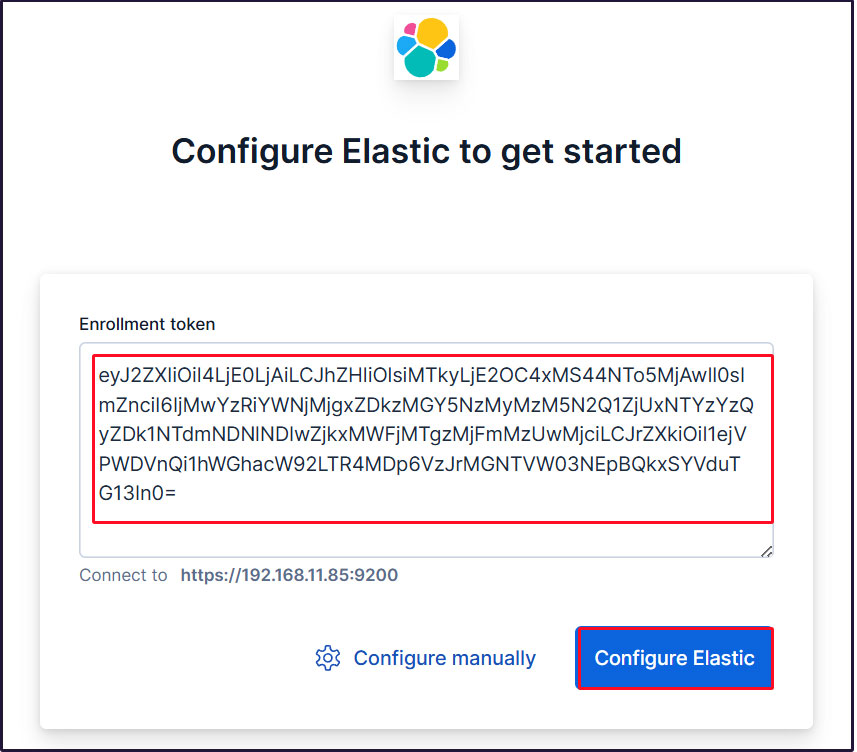
Paste the token and Kibana will automatically connect to Elasticsearch.
Click Configure Elastic. Your settings will be saved and Elasticsearch will be configured and restarted.
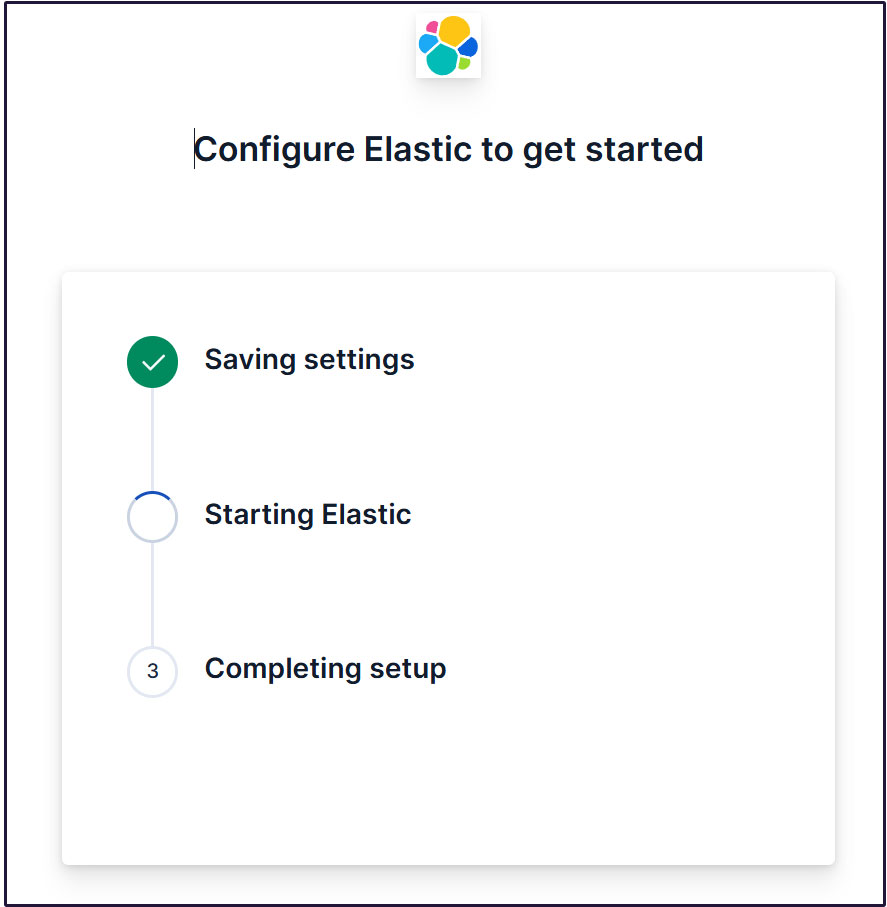
Go to the login page. Log in using the generated Elastic user credentials.
Username : elastic
Password : Easy-to-understand regenerated passwords
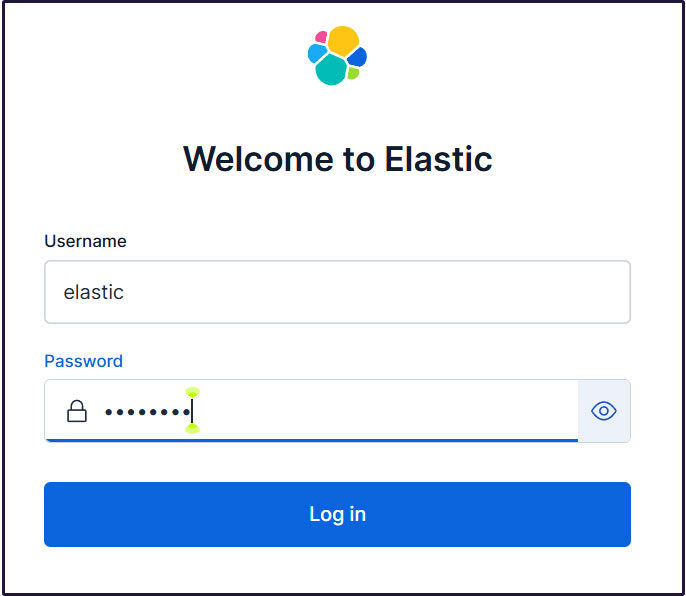
On the welcome page, click "Explore on my own" to proceed to the Kibana 9.x dashboard.
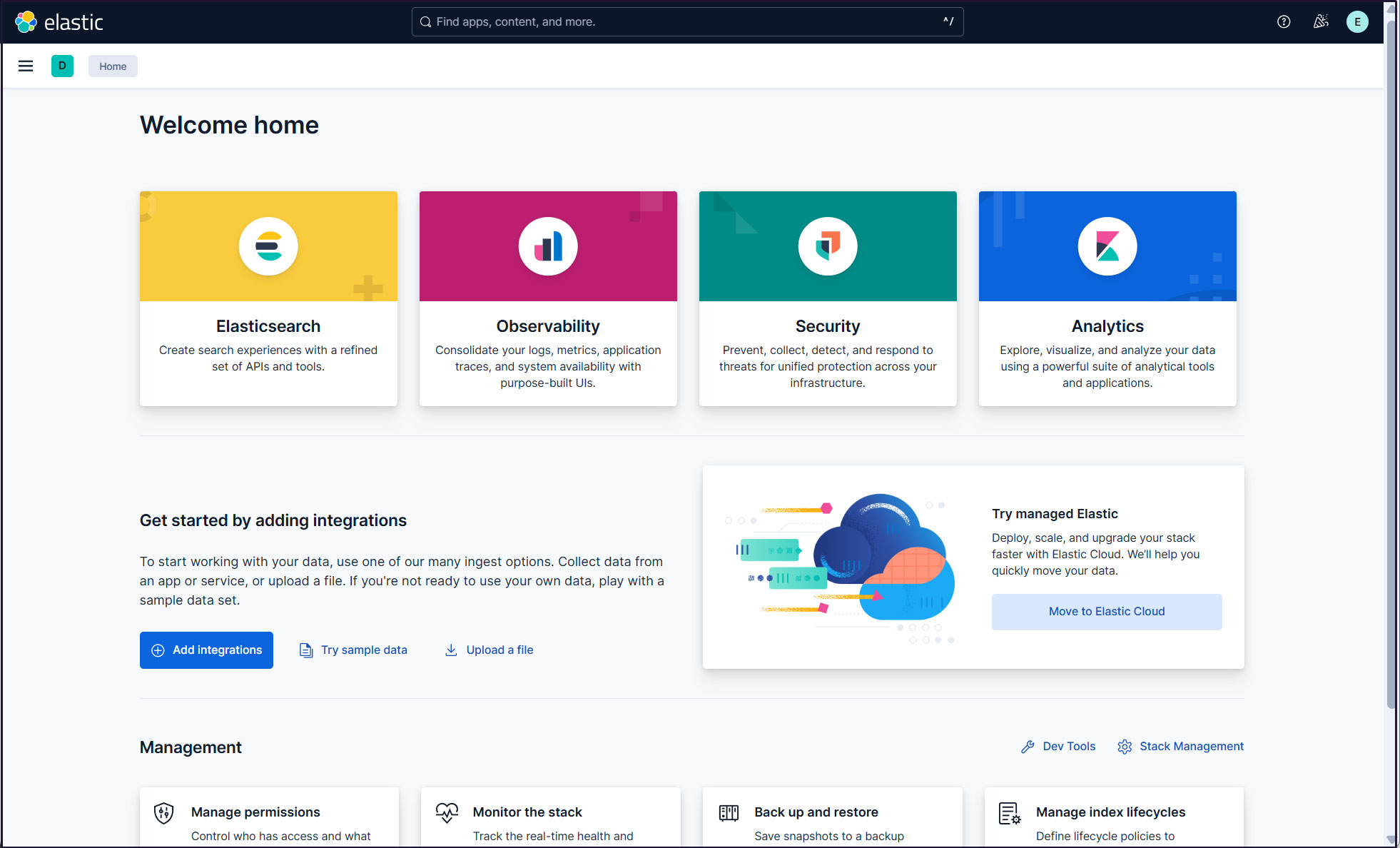
Installing Filebeat 9
To collect and monitor logs from Debian 13.1 using the ELK stack, Filebeat must be installed.
This work will be performed on the first server Debian13.1 IP address (192.168.11.83).
①Install Elastic Repos
To install Filebeat 9, you must install the Elastic 9.x repository.
Be sure to install the latest version of Filebeat. Installing an older version may cause a bug where nothing appears in Kibana events.
|
1 2 |
# wget -qO - https://artifacts.elastic.co/GPG-KEY-elasticsearch | \ gpg --dearmor > /etc/apt/trusted.gpg.d/elk.gpg |
|
1 2 |
# echo "deb https://artifacts.elastic.co/packages/9.x/apt stable main" \ > /etc/apt/sources.list.d/elastic-9.list |
update
|
1 |
# apt update |
Install Filebeat 9
|
1 |
# apt install filebeat |
➁Configuring Filebeat Logging
The default filebeat configuration file is /etc/filebeat/filebeat.yml
To make Filebeat write logs to its own log file, enter the following settings in the configuration file
|
1 2 3 4 5 6 7 8 9 |
# cat >> /etc/filebeat/filebeat.yml << 'EOL' logging.level: info logging.to_files: true logging.files: path: /var/log/filebeat name: filebeat keepfiles: 7 permissions: 0640 EOL |
➂Connecting Filebeat to the data processing system
Configure Filebeat to connect to a data processing system. In this case, it is Elasticsearch.
To send logs directly to Elasticsearch, edit the Filebeat configuration file and update the Output Settings section.
Connecting to Elasticsearch 9 requires SSL and authentication.
Make sure you can connect to Elasticsearch port 9200/tcp
|
1 2 3 4 5 |
# telnet 192.168.11.85 9200 Trying 192.168.11.85... Connected to 192.168.11.85. Escape character is '^]'. |
④Elasticsearch CA certificate creation
Download the Elasticsearch CA certificate and save it in a directory of your choice (this time as /etc/filebeat/elastic-ca.crt)
|
1 2 3 |
# openssl s_client -connect 192.168.11.85:9200 \ -showcerts </dev/null 2>/dev/null | \ openssl x509 -outform PEM > /etc/filebeat/elastic-ca.crt |
Get the credentials that Filebeat uses to authenticate to Elasticsearch. In this case, we will use the default superadmin and Elastic user credentials.
|
1 2 3 4 5 6 7 8 9 10 11 12 13 14 15 16 17 18 19 20 21 22 23 24 |
# vi /etc/filebeat/filebeat.yml Per Line 143 : Change Kibana section as follows #host: "localhost:5601" host: "192.168.11.85:5601" Change the Elasticsearch Output section per line 170 as follows output.elasticsearch: # Array of hosts to connect to. #hosts: ["localhost:9200"] hosts: ["192.168.11.85:9200"] # Performance preset - one of "balanced", "throughput", "scale", # "latency", or "custom". preset: balanced # Protocol - either `http` (default) or `https`. protocol: "https" ssl.certificate_authorities: ["/etc/filebeat/elastic-ca.crt"] # Authentication credentials - either API key or username/password. #api_key: "id:api_key" username: "elastic" password: "Password" ←Password for elastic created on the second server |
⑤Configuration File Test
|
1 2 |
# filebeat test config Config OK |
⑥Test Filebeat output connections
|
1 2 3 4 5 6 7 8 9 10 11 12 13 14 15 16 |
# filebeat test output elasticsearch: https://192.168.11.85:9200... parse url... OK connection... parse host... OK dns lookup... OK addresses: 192.168.11.85 dial up... OK TLS... security... WARN server's certificate chain verification is disabled handshake... OK TLS version: TLSv1.3 dial up... OK talk to server... OK version: 9.1.4 |
⑦Set up initial environment
Load the SIEM dashboard and pipeline into Elasticsearch
filebeat setup command
|
1 2 3 4 5 6 |
# filebeat setup -e ---------------------------------------------------------------------------- o","file.line":134},"message":"Elasticsearch pipeline loaded.","service.name":"filebeat","pipeline":"filebeat-9.1.5-suricata-eve-tls","ecs.version":"1.6.0"} {"log.level":"info","@timestamp":"2025-10-13T08:33:02.556+0900","log.logger":"modules","log.origin":{"function":"github.com/elastic/beats/v7/filebeat/fileset.LoadPipeline","file.name":"fileset/pipelines.go","file.line":134},"message":"Elasticsearch pipeline loaded.","service.name":"filebeat","pipeline":"filebeat-9.1.5-suricata-eve-http","ecs.version":"1.6.0"} Loaded Ingest pipelines |
⑧Filebeat service launched
|
1 |
# systemctl start filebeat.service |
⑩Check with Kibana
Log back into Kibana at accsess http://192.168.11.85:5601
Type "Suricata Events Overview" in the top search field and click [Filebeat Suricata]Events Overview
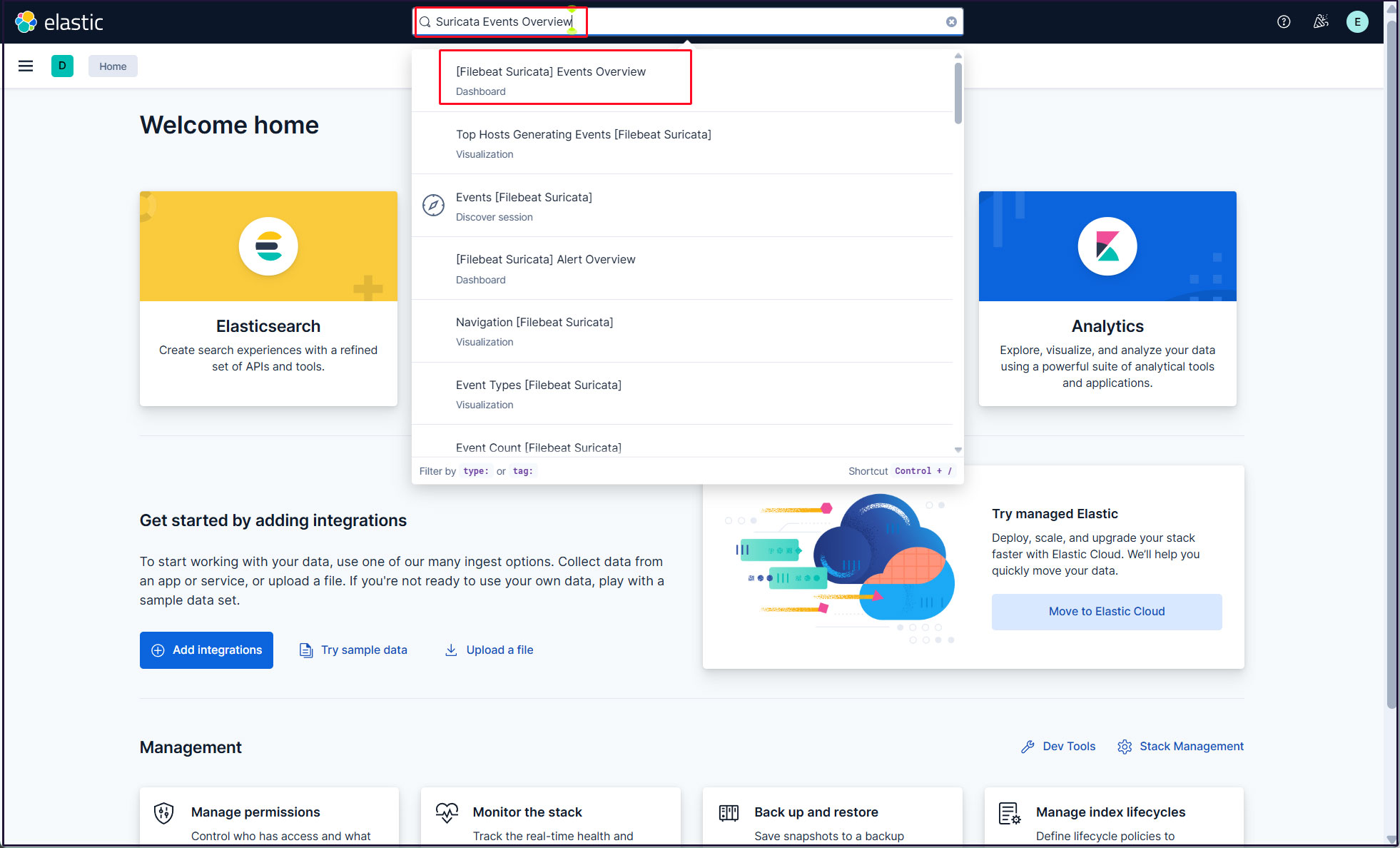
All Suricata events in the last 15 minutes are displayed
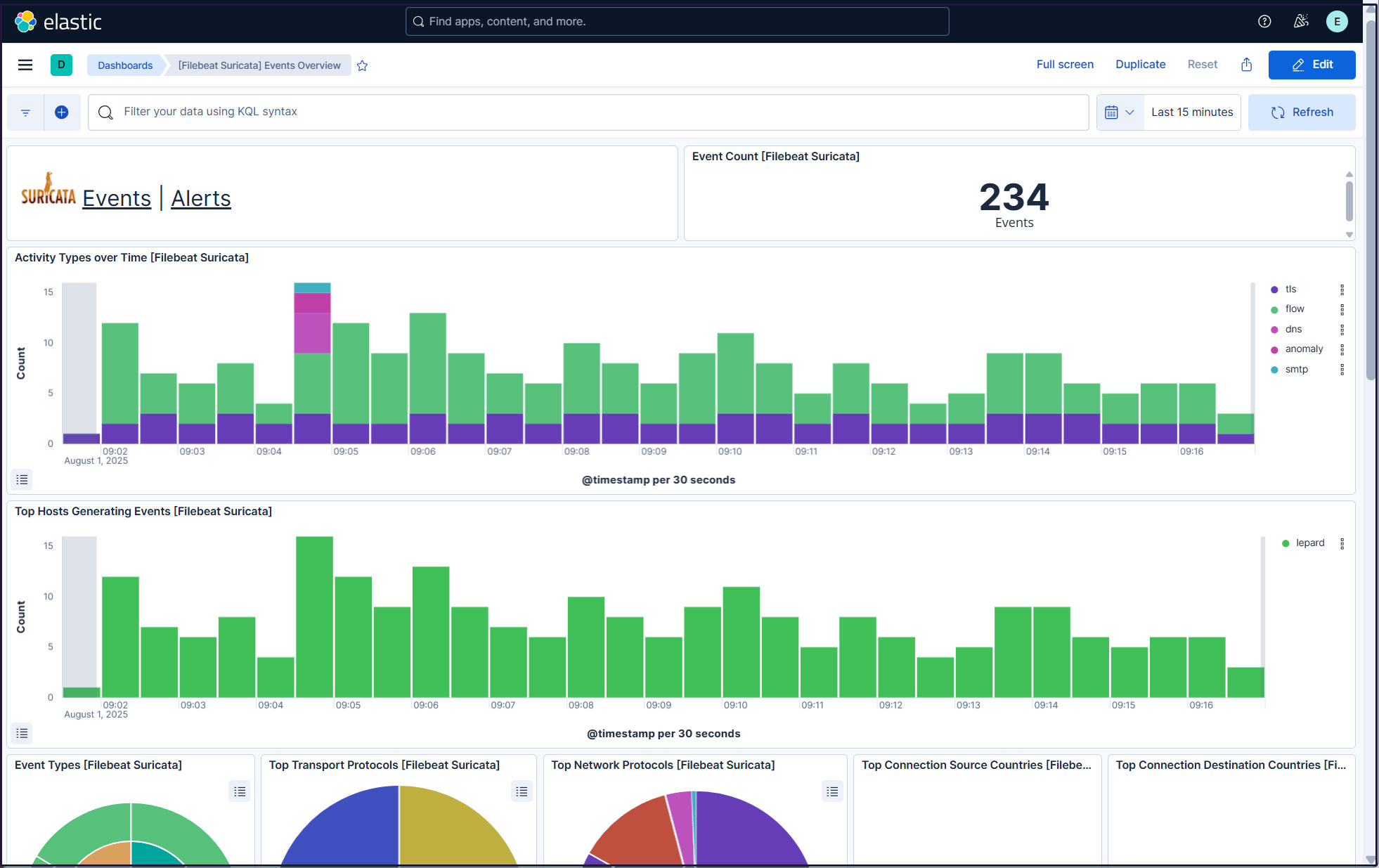
Click on the Alerts text next to the Suricata logo for malicious traffic alerts
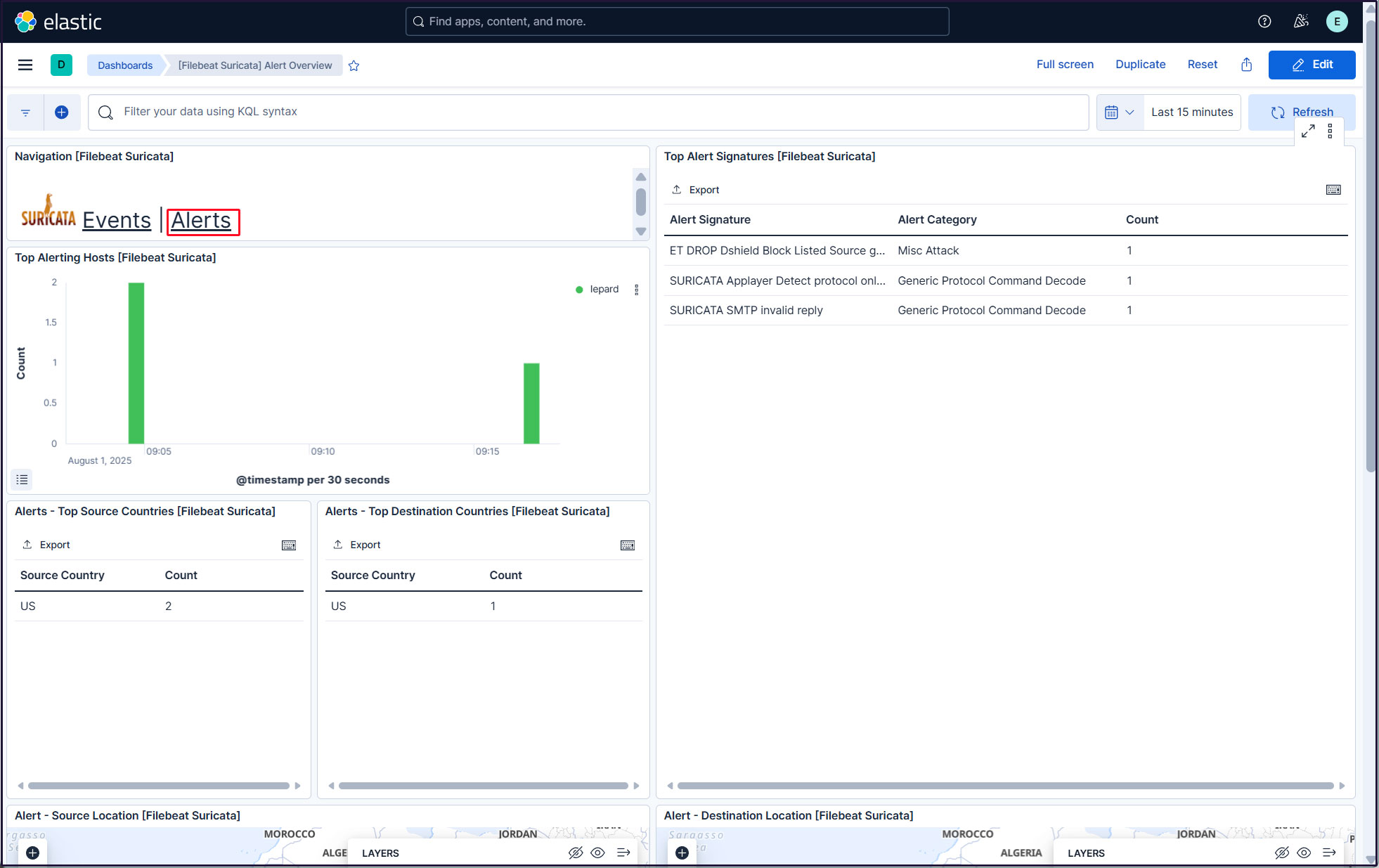
Create a new user account so that you do not have to use the elastic superuser account.
Click on the three-line mark in the upper left corner and select "Stack Management" under "Management"
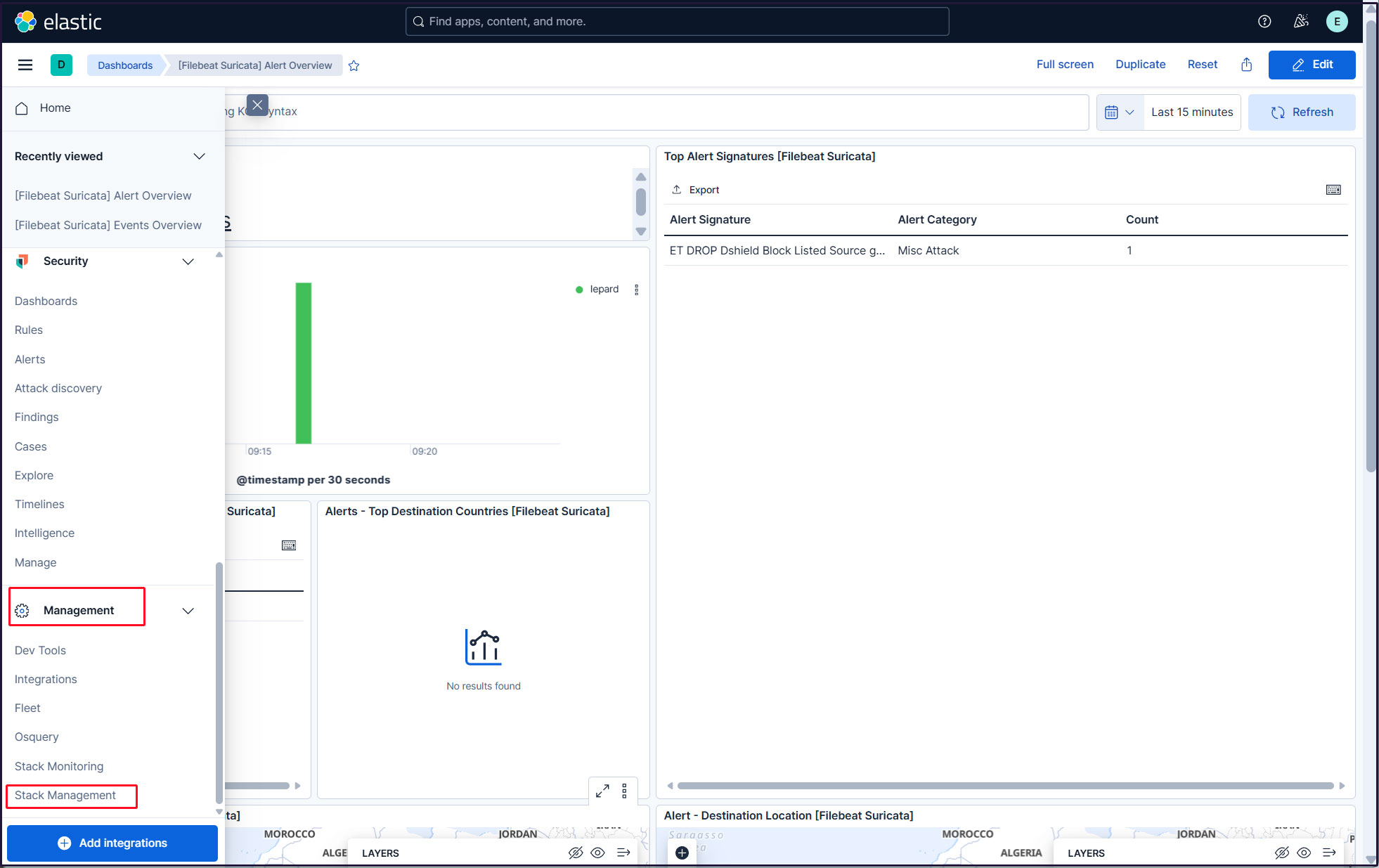
Select "security" and "Users"
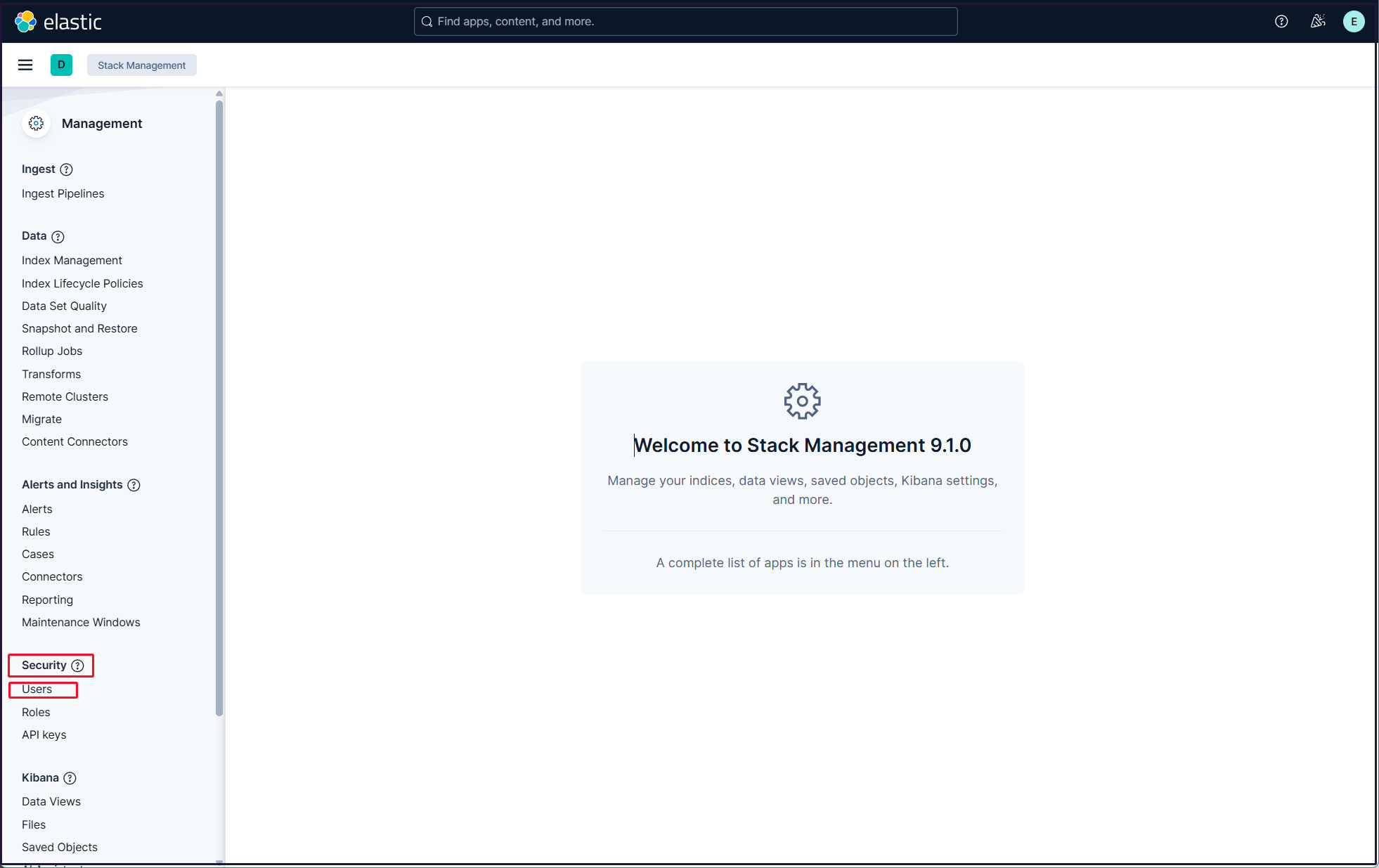
Click on the "Create user" button in the upper right corner
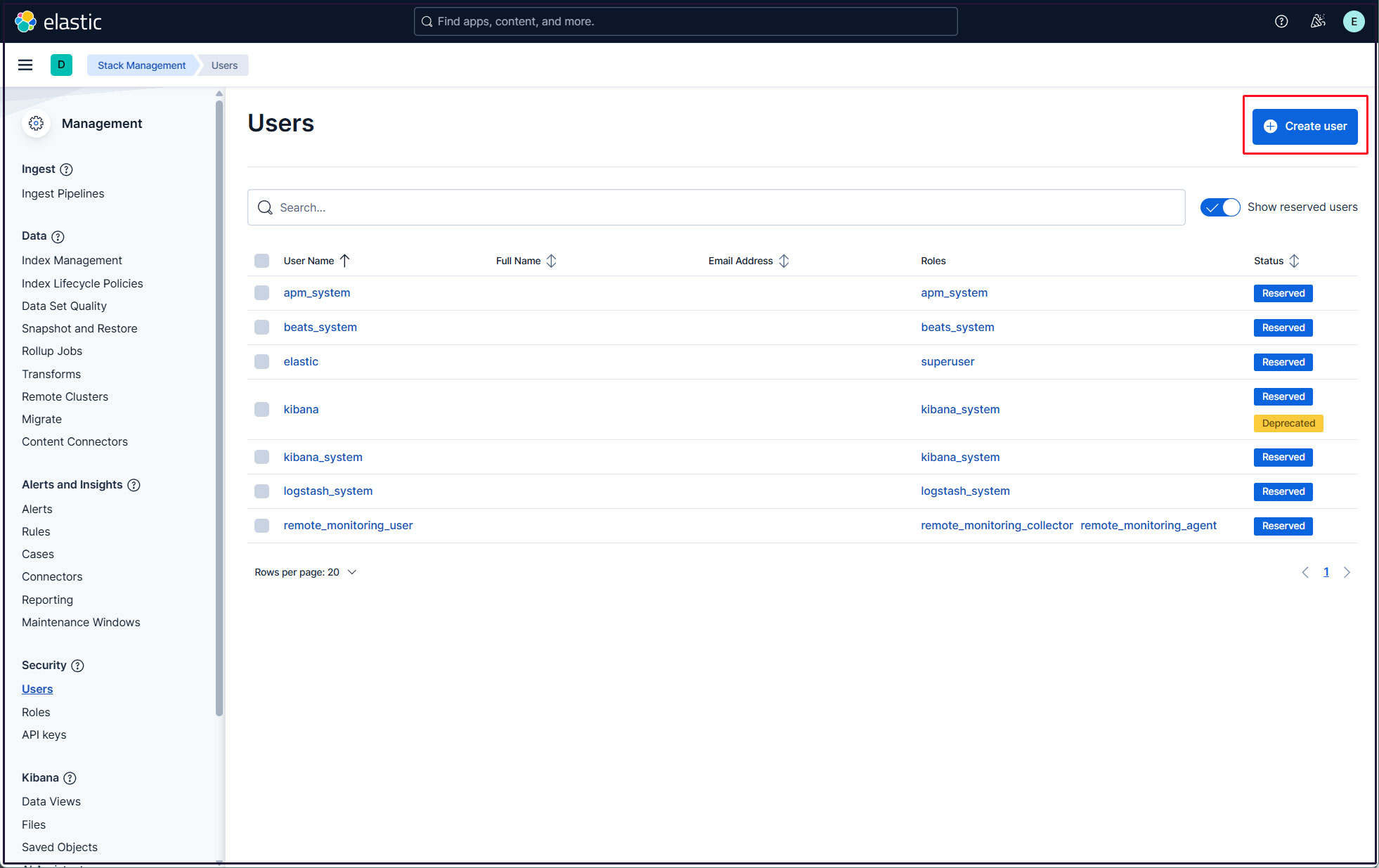
Enter new user information, assign the roles kibana_admin, kibana_system, monitoring_user, and editor in Privileges, and finally click Create user
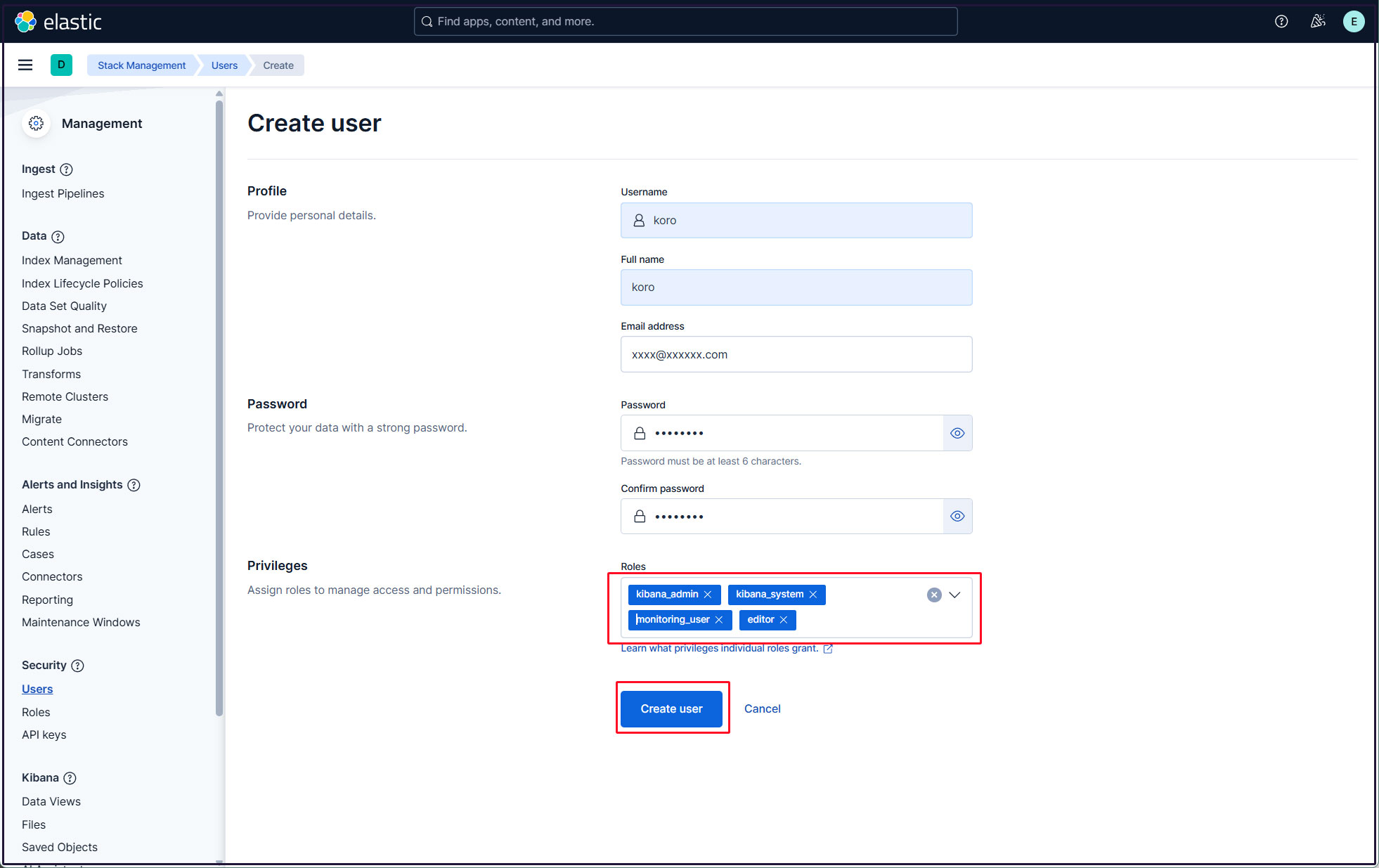
Log out of the current profile and confirm that you can log in with the newly created user account.

